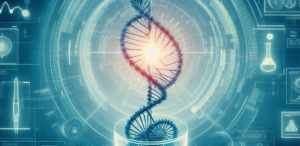
Synthetic biology, a field that combines the principles of engineering and biology, has captured the imagination of scientists, innovators, and the general public alike. By harnessing the power of genetic engineering and computational tools, synthetic biologists are redefining the boundaries of what is possible, creating novel organisms and systems that hold immense promise for transforming various aspects of our world. However, with this promise comes a set of unique challenges and ethical considerations that must be carefully navigated. This blog explores the captivating realm of synthetic biology, delving into its potential applications, the ethical dilemmas it presents, and the critical steps necessary to ensure that the development of this transformative field remains responsible and sustainable.
Sculpting the Future: The Promise of Synthetic Biology
Synthetic biology offers a multitude of exciting possibilities, from revolutionizing healthcare to addressing global challenges in agriculture and energy production. In the realm of medicine, researchers are engineering bacteria or viruses to detect and eliminate cancer cells, deliver targeted therapies, or monitor and maintain overall health. Additionally, synthetic biology has the potential to accelerate the development of vaccines and therapeutics, as well as personalized treatments tailored to an individual’s genetic makeup.
In the agricultural sector, synthetic biology is being leveraged to engineer crops that are more resilient, nutritious, and resistant to pests and diseases, with the aim of addressing global food security challenges. Moreover, synthetic biology offers solutions for sustainable energy production, such as the creation of biofuels from engineered microorganisms or the development of self-repairing materials inspired by nature.
Confronting the Challenges: Ethical Considerations in Synthetic Biology
As with any transformative technology, synthetic biology raises important ethical questions that must be carefully considered. Issues surrounding biosafety, biosecurity, and the potential misuse of engineered organisms require robust governance frameworks and international collaboration. The societal implications of synthetic biology, such as the impact on employment, equity, and the environment, must also be thoroughly examined and addressed.
One of the most pressing ethical concerns in synthetic biology is the potential for unintended consequences. As researchers create novel organisms and systems, there is a risk of unforeseen interactions with the natural world, which could lead to ecological disruptions or the emergence of new threats. Rigorous testing and risk assessment protocols are essential to mitigate these risks and ensure that the development of synthetic biology remains responsible and sustainable.
Navigating the Path Forward: Collaboration and Responsible Innovation
Addressing the challenges and realising the promise of synthetic biology will require a concerted effort from various stakeholders, including researchers, policymakers, industry leaders, and the general public. Fostering interdisciplinary collaboration and promoting open dialogue will be crucial in shaping the future of this field.
Researchers must work closely with ethicists and policymakers to develop robust governance frameworks that balance the potential benefits of synthetic biology with the need to protect public safety and the environment. These frameworks should include clear guidelines for biosafety, biosecurity, and the responsible use of genetic engineering technologies.
Industry leaders must also play a role in promoting responsible innovation, by investing in research and development that prioritizes sustainability and social responsibility. Collaborations between academia, industry, and government will be essential in driving the development of synthetic biology in a direction that benefits society as a whole.
How is synthetic biology influencing food production ?
- Microbial Production of Food Components:
– Synthetic biology is enabling the microbial production of various food ingredients like proteins, lipids, vitamins, and amino acids. This provides an alternative, sustainable source of these nutrients.
– Engineered microbes can be used as “cell factories” to produce food components more efficiently and with greater control over the final product.
- Improving Crop Traits:
– Synthetic biology techniques like genetic engineering and CRISPR are being used to modify crops and make them more resilient, nutritious, and resistant to pests and diseases.
– This can help address challenges around food security, environmental sustainability, and nutritional deficiencies.
- Expanding Feedstock Utilisation:
– Synthetic biology is enabling the use of alternative feedstocks like methanol and CO2 for microbial food production, reducing reliance on traditional agricultural feedstocks.
– This can help mitigate the environmental impact of food production and make the process more sustainable.
- Enhancing Food Quality and Nutrition:
– Synthetic biology allows for the precise engineering of food ingredients to improve their taste, texture, and nutritional profile.
– This can lead to the development of healthier and more personalised food products.
- Reducing Environmental Impact:
– Microbial food production facilitated by synthetic biology can be more environmentally friendly compared to traditional agriculture, reducing land, water, and energy use.
– Strategies like engineering nitrogen-fixing microbes can also help minimise the environmental footprint of food production.
Overall, synthetic biology is revolutionising the food industry by providing new tools and approaches to address challenges around food security, sustainability, and nutritional quality. However, the technology also raises ethical considerations that need to be carefully navigated.
Conclusion
Synthetic biology represents a transformative leap in our understanding and manipulation of life itself. By sculpting the future of life, we have the power to address some of the most pressing challenges facing our world, from curing diseases to ensuring food and energy security. However, as we embark on this exciting journey, we must remain vigilant to the potential risks and ethical considerations that accompany this pioneering science.
Through collaboration, responsible innovation, and a steadfast commitment to sustainability, we can harness the power of synthetic biology to create a better future for all. The path forward may not be without challenges, but by working together and staying true to our values, we can ensure that the development of synthetic biology remains a force for good, shaping a world that is healthier, more sustainable, and more equitable for generations to come.
Citations:
[1] https://pubmed.ncbi.nlm.nih.gov/35120749/
[2] https://www.genscript.com/applications-of-synthetic-biology-in-food-industry-and-agriculture.html
[3] https://www.sciencedirect.com/science/article/pii/S0167779922000026
[4] https://www.twistbioscience.com/blog/perspectives/synthetic-biology-sustainable-food
[5] https://link.springer.com/article/10.1007/s43393-022-00150-3



